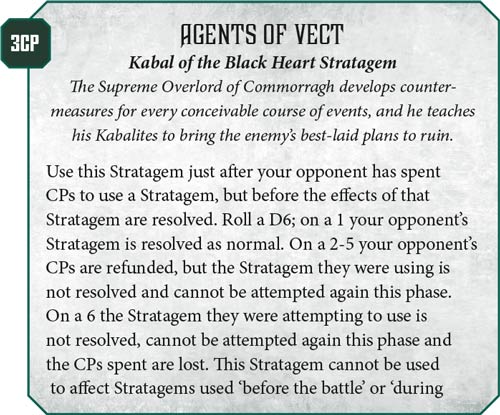This article is brought to you by Nights At The Game Table. Click here to see all of our battle reports, articles, and more!
Welcome to Warhammer Tactics! Today, we’re going to be taking a look at one of the most infamous and powerful stratagems in the game, and what you can do to fight against it. Obviously, I’m talking about Agents of Vect.
Many a player has been completely dominated by the power of Agents of Vect, usually coming from a failure to adapt and properly fight against it. Knowledge is power, so in order to learn how to fight against Agents of Vect (hereafter simply AOV), we need to first understand AOV’s weaknesses.
 Weakness 1: Cost
Weakness 1: Cost
Right off the bat we see that AOV has a very high CP cost at 3CP. This is already one of the main drawbacks with AOV, which is its high opportunity cost. When a Drukhari player spends 3CP on AOV, he’s also making an active choice to not spend that 3CP on all the other things he could possibly spend it on.
Think about it this way: You have 10$, and you want to get some food. You can go to Burger King, or McDonald’s. You decide to go to McDonald’s and go get a Big Mac. Now, since you spent your money at McDonald’s, you can’t go shop at Burger King. In this little example, not eating Burger King is our opportunity cost, since we chose to not get Burger King when we chose to eat McDonald’s.
With that in mind, let’s move this back into the realm of 40K and tactics. Every time our opponent uses AOV, the 3CP he spends can no longer be used later in the game. This means that even a couple of uses of Agents of Vect will severely restrict our opponent’s ability to use other stratagems.
Weakness 2: Usage
Another critical limitation to AOV is the fact that it’s naturally restricted to being used only once per phase. Most armies will want to use multiple stratagems in at least a phase or two. Which stratagems and phases will vary depending on the army.

For this article, let’s look at Tau as an example. A solid Tau list will probably be looking to use Uplinked Markerlight (basically +d3 markerlights on a target), Command and Control Node (re-roll wounds for a Battlesuit unit), probably at some point a Command Re-roll, and depending on their sept, the sept stratagem too.
That’s 3 or 4 different stratagems, and this is by no means an exhaustive list! AOV can only stop one of these stratagems, and the rest will go off like normal. This means the Drukhari player has to make a choice on what to stop. We’ll talk more about this later, but for now, just know that making our opponent make choices is a good thing.
Weakness 3: Refunds
The last major weakness to AOV is that it refunds the CP cost of the stratagem it stops, at least most of the time. Occasionally, it won’t refund your CP, but this only happens about 1/6th of the time. Most of the time, you’ll get a full refund, and this is important because it means that we still have our other stratagems available to us, while the opponent sacrifices their ability to use other stratagems more and more every time they use AOV. So, as the game goes on, we should start to overtake our opponent in CP totals, and we can leverage that CP lead to our advantage.
So, we have the weaknesses to AOV now, and that’s an important start. To be clear, just because AOV has many weaknesses does not mean it’s a weak stratagem. Many players have been completely blown out of the water by this ability, and if you don’t adapt your gameplay around it when you see Drukhari across the table from you, you too will have your work cut out for you to survive.
However, AOV is not insurmountable. The question is: What can we do? Luckily, the answer is short and simple. You do everything you can to make your opponent make difficult choices. What isn’t easy, however, is putting the answer into action.
Defeating AOV
All of the weaknesses of AOV come back to forcing our opponent to make choices. When our opponent makes a choice, they run the risk of making a mistake. If you make them make enough choices, you can push them into a situation that doesn’t have a right answer.
Every time they use AOV, they choose to not have that CP to spend elsewhere. Every time they choose a stratagem to stop, they also choose to let every other stratagem that we use that phase happen. By leveraging these facts against our opponent and changing up how we use our stratagems, we make our opponent start to make difficult choices. And with difficult choices come misplays, mistakes, and no win situations for our opponent.

Let’s say we’re playing Chaos Space Marines. We can make our opponent choose to stop Veterans of the Long War or Endless Cacophony by using Vets very early in the phase. Ideally, we want to use Vets on the first unit we shoot with. If they block Vets, they can’t block any other actions for the rest of the phase. If they don’t block Vets, we can start using other stratagems to try to goad them to block one.
This is especially impactful if we make the choice a painful one, like a CP re-roll on part of an Obliterator’s weapon profile, or Daemon Shell on a high priority target, or some other critical stratagem. If they do decide to block one of these stratagems, they let us hit him with Endless Cacophony at the end of the phase. If they don’t, we still get other high impact stratagems off. In addition, we can put our opponent in a situation where maybe they really want to use an important stratagem of their own, like Lightning Fast Reactions to protect one of their units. Doing so eats up more of their CP, which means they likely have one less AOV down the line. If they don’t use Lightning Fast Reactions to protect their unit so they can use AOV later on, then we get to lay down the pain on their squishy Drukhari.
The specifics of what you need to do in terms of changing up how you approach using your CP is going to be army- and list-dependent of course, but the idea is always the same. Once you start trying to find ways to use AOV to control what your opponent does with their CP, instead of letting AOV control your CP use, you’re back in the game. If you can bait your opponent into using AOV on a stratagem that you don’t really care about, you come out ahead. If you find ways to use other stratagems to accomplish your goal, while threatening an important stratagem, you also come out ahead. You’ll need some practice and a little book work with your codex to figure out how to do this, but hopefully now you have an idea of what you can do to fight AOV instead of letting AOV control you and the pace of the match.
Before we leave, there is one caveat that is tangentially related to AOV, and that’s Labyrinthine Cunning: the Kabal of the Black Heart Warlord Trait.

Cunning is an all in one, highly consistent CP regeneration ability. It’s commonly taken in any army that has a Kabal of the Black Heart detachment, and for good reason. Many armies have access to CP regeneration, but those abilities and relics tend to be a sort of “boom or bust” mechanic, where you have games where they don’t generate anything, and then you have games where they generate a ton of CP. Cunning tends to be far more consistent because of how it works, which makes it more reliable. If you see your opponent has this as their warlord trait, be aware that they have a consistent but slow flow of CP coming from both you and them. This shouldn’t shift your strategy around AOV in any major way. Just be aware that the opponent has more CP to work with, which means the opportunity cost to using AOV is lowered. Unless your opponent rolls crazy hot at some point, they won’t get more than 6 or 7 CP from the trait over a game. That’s not a small number of course, but it’s not insurmountable either.
Hopefully you’re already starting to see ways you can apply the strategies discussed here with your army or favorite list. Just make sure to review of all of your stratagems, and get some practice in trying to push your opponent into making choices. I guarantee that over time you’ll start to get a few more wins against those dreaded Dark Eldar! Make sure to tune in next week, where I’ll be talking about pre-measuring and planning out your turns properly!
And remember, Frontline Gaming sells gaming products at a discount, every day in their webcart!




I just choose to make armies that don’t require the use of stratagems to function
That is a good principle for list design but there are a few issues with the principle overall. For one, some armies are considered underpowered and the strategems give them the power boost to make them competitive. AOV simply hinders or removes that ability for those weak codexes. Second, while you can say your list functions without strategems, but there will always be situations that arise that the use of strategems can affect the game in big ways. Like you don’t need veterans of the long war to kill enemies, but it makes it certainly easier. Also games could depend on those situations as well. You may win or lose a game based on the result of your assault or shooting and VotLW easily puts the odds in your favor. AOV, however, stops that. Lastly, some people simply ignore strategems to avoid being hurt by AOV. This is not the best solution as you are not putting the AOV player in positions to make choices on the use of AOV. Spending 3 CPs to stop your 1 pt strategem is a big opportunity cost as they could spend those 3 cps elsewhere to do alot more than stop a VotLW for example.
Overall, the idea the author is trying to communicate is that AOV is something you should be aware of and if you encounter it, some good tactics on how to deal with it.
It’s actually a pretty similar principle to trying to get a key Psychic Power past your Opponent’s Deny attempts. There are differences (there usually hasn’t been a long-term opportunity cost to Deny attempts), but if you’ve used a Psyker-heavy Army in the last couple of Editions, the basic process should be familiar.